
The fact is we all share the very same world. But we also all try to make sense out of the world we live in. One way we all make sense of what we see in other people is to assign meaning to what we see according to what it would mean if we were engaging in that behavior. Most of the time this strategy serves us well.
Here are examples of behavior from students I’ve seen in schools along with the erroneous meaning assigned to the behavior and followed by the actual reason for the behavior.
Head Banging
Behavior: This little girl banged her head onto concrete walks and into walls several times a day both at home and at school. She was so forceful as to give herself a concussion. Because of that she was wearing a helmet.
Meaning Assigned to Behavior: People tried to make sense out of this little girl’s head banging. They took data in attempts to discover a pattern. They used the data to conclude the girl engaged in head banging whenever she was asked to do something she didn’t want to do.
Actual Reason for Behavior: After six months of mostly unsuccessful behavior shaping and reward systems it was discovered the little girl had a severe case of head lice. Once the head lice was eradicated the head banging stopped completely.
Dropping To The Floor
Behavior: Whenever this First Grader left his classroom with the rest of his class when he crossed the threshold into the hallway he would drop to the floor yelling, “No, no, no!” He would roll around on the floor until an adult approached him. As soon as the adult tried to take his hand and help him up this little boy would start playfully pulling back on her hand and giggling. After a short time of this he would get up and walk down the hallway to his destination. When the child was the only student leaving the classroom with the Speech Therapist or the Reading Specialist he did not fall to the floor.
Meaning Assigned to Behavior: Everyone on this child’s IEP Team had decided that he “pitched a fit” when leaving the room with the rest of the class because he preferred the one on one attention of an adult – any adult. They collected data and used it to confirm their hypothesis was correct because the “fit throwing” only happened when the little boy left the room with his classmates, but whenever he left with any adult, even a stranger, he did not “throw his fit.”
Actual Reason For the Behavior: The little boy had an unreliable sense of proprioception. For him, whenever seeing much movement was combined with space change along with lighting change his sense of proprioception bottomed out. These conditions were met each time several students left the classroom at the same time. When the little boy left the classroom with only one other person the movement was much less so as long as he held the hand of the adult his proprioception was such that he could walk down the hall even though the space and lighting had changed. Additionally, when his proprioception betrayed him and someone took his hand trying to help pull him up it delivered proprioceptive input to his joints and muscles after which he was able to stand up and walk.
These are but two of numerous examples of what can happen when we assign meaning to behavior according to what that behavior would mean if we were engaged in it. Furthermore, sometimes even the data we collect actually supports our wrong guess!
This is so dangerous. We wind up assigning negative character traits to our children. In the stories above the little girl was thought to be stubborn and insisting on having her own way and the little boy was labeled an attention seeker. Once the negative character traits have been assigned we all feel off the hook in terms of needing to solve the problem – in fact we start thinking and even saying that it is the child’s own fault, blaming him for willful behavior.
Both of these children were nonverbal and both were said to be “in their own worlds” when they were, in fact, engaging in behavior that communicated very real problems. We need to stop saying people are in their own world when they have disabilities or different neurologies such as autism. It serves nobody well when our words draw a line, placing those who are different away from us, those we say are “in their own world” on the other side of that line – the side for those people who we can then not consider real human beings. After all, they are “in their own world.”
Whether we understand somebody else’s behavior or not the fact remains we all share the very same world. To speak differently not only attempts to minimize the humanity of others, but also sets us up for our own failure as human beings. If you describe autistic or disabled people as in their own world will you please stop?
Thank you so much,
Judy Endow


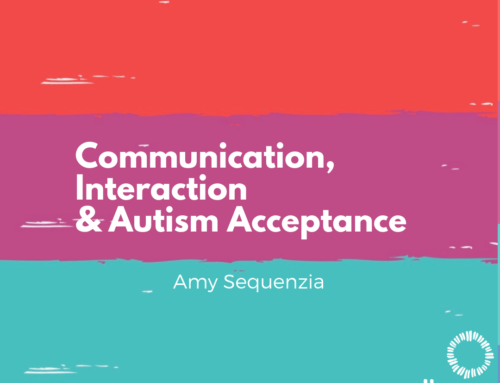
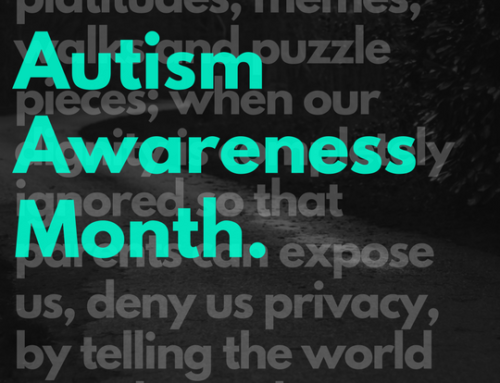
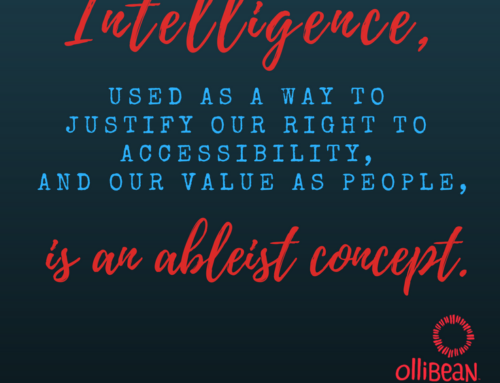
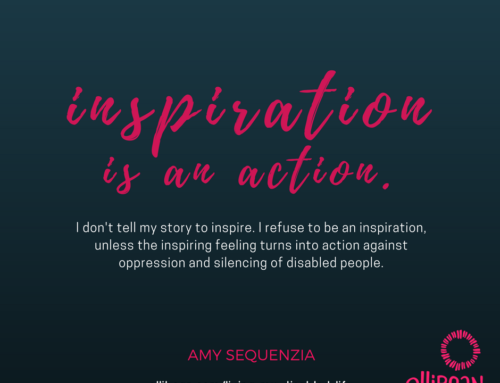
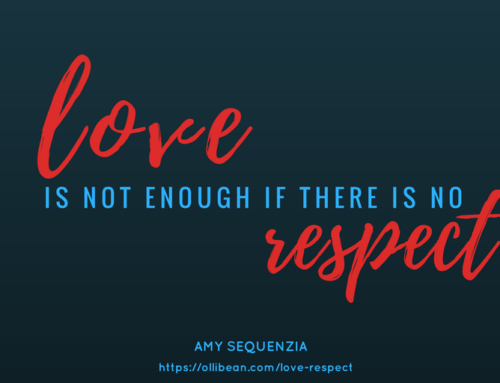
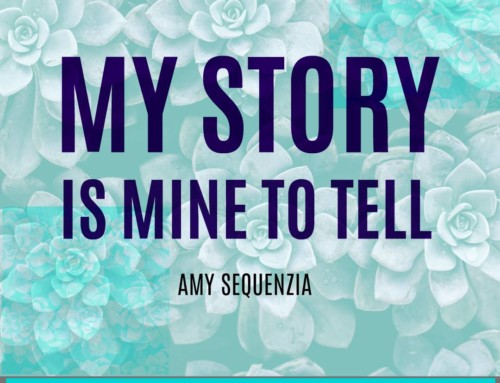
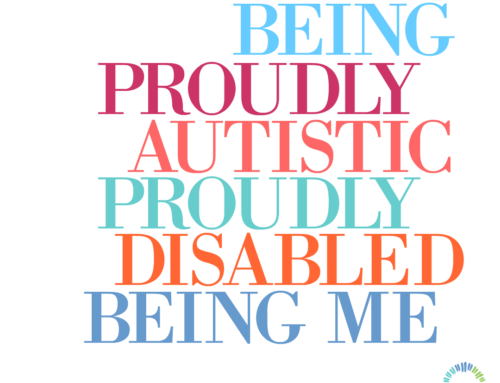
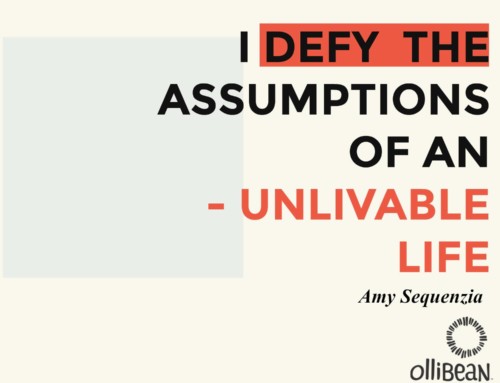
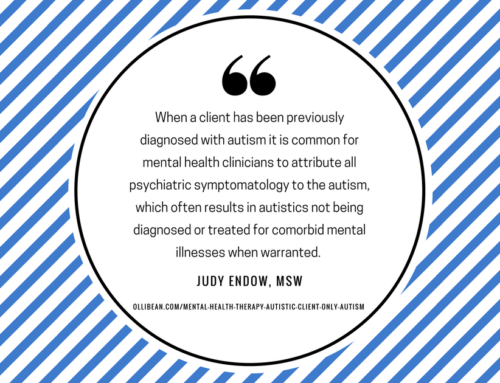
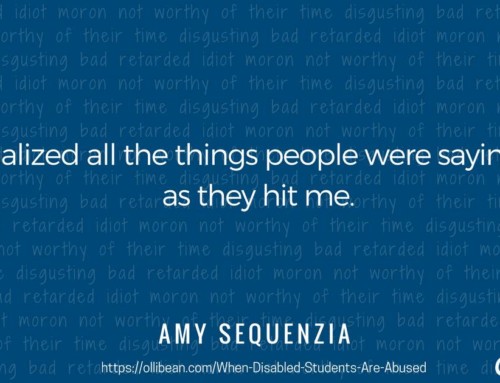

Yes, THIS!
Probably could have had the same outcome with some slow, quiet time with the child, and avoided all the wasted time and frustration. “Behaviors” (school language) are prompted by something. Why is it so hard to understand that?
Very true. It is weird to me how often people will assign convoluted emotional motives to what is simply practical behavior.
thank you
This certainly applies to ALL people, not just those with special needs. We have no way of knowing someone else’s motivation.
I disagree with her I was more sevre when younger basicly non verble had tantrums an was in my own world to the point I have no memoreys of being litte up to a certin age when my langue got beter I can rember more.but I’m in my world I miss so much what is going on at times I’m nothing like when younger I can talk to p[eople an stuff.but I wouldn’t say we aren’t some may apper that way some are very conncted even when severe som can be how I was or still am sometimes.but she shouldn’t say no one is she can only go by her own expernice.
I so appreciate you posting this and showing how ‘what we think we know” we really know nothing about. I used to work in a state institution with a group of wonderfui coworkers (come on ya all know who you are). We would sometimes see old ‘traning’ videos where ‘experts’ had come in, evaluated individuals, then stated emphatically things that individual would never be able to do. We would shake our heads, laugh, feel angered, frustrated with them and dismayed, and go on out to that same individual who was doing “exactly” what was “known” they would “never” be able to do. ya know, a lot of times it isn’t the individuals with disabilities who have the true issues. it sure seems like all of us are too busy squeezing people into boxes with labels that we forget we are all part of the human race. personally, I have put myself into a lot of boxes, crimping and crumbling my own wings.. we are all beautifully unique and wonderfully the same……. makes a lot more sense to me to raise each other up and remember to take care of our wants and needs.. I know insurances and doctors and some need a standard way of describing data for medications and stuff but.. let’s drop labels… maybe that’s what we need, to change our labels from “disorders’ or ‘syndromes’ or ‘spectrums’ or whaterver it may be and just see into each others abilities with genuine care interest and love. differences are uniquenesses not reasons to separate but to enrich each other’s life experiences cuz we sure couldn’t just go out and experience beauty from every standpoint, but we can listen and hear and ask about and be there to witness Life as we also participate in being alive… the more we try and label and box people in the more we limited we become.
Bless you! <3
The little boy you spoke of who would flop to the floor upon entering or leaving a room could have been my son. How was it discovered that the proprioceptive sense was the cause? If I had only known back then!
guilty…
It is beyond scary and depressing to be that child (or adult) when people assign incorrect and often Machiavellian reasons for your behavior. I have been there –for at least 20-40 years on and off. Angry people asking “Are you *trying* to make me angry?”; “You must be a sociopath” ; “Why do you insist on fighting us?” It is a nightmare that causes repeated panic-attacks and PTSD. Imagine hearing and seeing people red-faced in anger putting you down “You’ll never make it in life”; “No wonder you have no friends”; “You are so idiotic, stupid, and bratty”; over and over; feeling the same panic and just wanting to to be dead to escape this repeated cycle of people misunderstanding your best attempts at getting through the day only to be either condescended to, pitied, or verbally abused at a loud volume, with loud faces, and loud “consequences”. They take away or punish your only comfort or escape from the PTSD or other assaults on the senses by, for example listening to the same pleasant song over and over at a loud volume; then they try to even physically restrain you from the one of the last resorts: stopping the mental pain by causing some kind of physical distraction with your *own* body. There is nothing left but screaming or going into a some delusional fantasy world (if you are lucky enough to have your brain give you that comfort– not everyone’s brain does that consistently, sadly) when they even take the ability to control one’s *own* body away. I remember reading a parent talking about how the offending stims release natural endorphins, then condemn the kid as a drug addict, an opioid addict getting their “fix”. Can’t have an autistic feel good about what embarrasses or irritates the parent, can we? No wonder there are so many “co-morbid conditions” that come with autism. No wonder intense interests or obsessions are delved into so enthusiastically and purposefully; the mind seems to be our last refuge. No wonder some kids violently try to stop what is hell for them. I cannot believe that parents post videos on public Youtube of the kid’s struggle to cope and frame it as “the hardship the parents have go through” when they have an autistic child. If this was a “normal” child, people would try to get to the root of *why* the child acts these ways, instead of assigning malintent or a mindless pathology that needs to be “cured” despite whatever the child is trying to communicate or address. If parents who really care about their child knew about this iatrogenic harm done to the innocent child, they themselves, would try to find relief from the guilt. Sometimes what they’ve done and allowed to happen to their child is so unthinkable in its cruelty, is so upsetting that perusing this belief system (that their child is “in his own world” or “not there”) even if they’ve found it to be incorrect, is violently clung to with cursing, slandering, malicious hacking, threats of violence, and outright acceptance of pseudoscience despite their reservations about it. I hope autistic adults and knowledgeable professionals can break through to the parents before they go down that road; if they would only listen.–End Rant—I’m so glad that Judy Endow and others have these blogs and articles on the internet for everyone to read how too many children are being misunderstood (to say the least). She really incarnates into words what so many autistic want to say.
Even though i am verbal and can articulate how i feel, i still will shut down when i feel like others are shutting down on me, or shutting me down.
My daughter would go to the toilet frequently. Sometimes 30 times a day, and would bend over double tring to squeeze out urine. If stopped she would become distressed and lash out at people. She was diagnosed with OCD. It turned out she had retention of urine because of the risperidone she was already on. It is very easy to come to wrong conclusions when some one cannot talk.m this caused her horrible distress and unnecessary medicating.